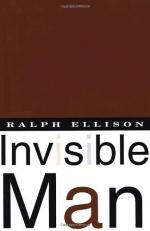
|
| Name: _________________________ | Period: ___________________ |
This test consists of 15 multiple choice questions and 5 short answer questions.
Multiple Choice Questions
1. What procedure is performed on the narrator?
(a) both castration and a lobotomy
(b) a prefrontal lobotomy
(c) mind control implants
(d) castration
2. What is most unusual about the narrator's residence?
(a) It is in a basement
(b) It is free
(c) It is filled with over 1300 light bulbs
(d) It is a white apartment house
3. The narrator's need to give speeches is an example of what literary device?
(a) suspense
(b) audio imagery
(c) foreshadowing
(d) irony
4. What does Trueblood's story suggest about the white men at the jail house?
(a) They were horrified by his story and tried to get him to move.
(b) They were angry and kept him in town as an example of how not to behave.
(c) They didn't believe his story.
(d) They secretly enjoyed hearing his story.
5. What kind of speeches has the narrator given from the stage in the chapel?
(a) Speeches that expressed his frustration in cultural symbolism.
(b) Phony speeches with notes supplied by white men.
(c) Genuine speeches that expressed how he felt.
(d) Speeches that flattered the whites.
6. What bit of advice from the young Mr. Emerson does the narrator actually heed?
(a) to forget about Mr. Bledsoe
(b) to call Liberty Paints and ask for a job
(c) to return to the college
(d) to realize that he has no identity
7. What is the vet's final advice to the narrator?
(a) Stay away from people like Mr. Norton
(b) Watch for opportunities to get close to people like Norton
(c) Defy people like Norton
(d) Find ways to manipulate people like Norton
8. Who else is on the bus to New York?
(a) no one
(b) the veteran doctor
(c) another student
(d) Mr. Trueblood
9. What does the narrator lack in Chapter 12?
(a) A sense of direction
(b) money to live on
(c) motivation to keep going
(d) his interest in returning to college
10. What revelation does the "Tom Show" provide for Ellison?
(a) It shows him that history is a part of the present
(b) It convinces him that history cannot be changed.
(c) It convinces him that history will be repeated
(d) It reveals the futility of fighting agains the majority.
11. What does the man in Emerson's office imply after reading the letter given him by the narrator?
(a) That the narrator is in fact someone else.
(b) That that narrator has already seen Mr. Emerson.
(c) That Mr. Emerson is the wrong person to help the narrator.
(d) That the narrator wrote the letters himself
12. Why is the narrator offended by the man behind the drugstore counter?
(a) The man wants to see his money before serving him.
(b) The man assumes will order the special of pork chops, grits, one egg, biscuits, and coffee.
(c) The man overcharges him.
(d) The man does not give him what he orders.
13. What does the narrator discuss with the woman in his dream?
(a) freedom
(b) fear
(c) racism
(d) responsibility
14. How does the narrator get past the drunken vet in the road?
(a) He claims to be someone of importance.
(b) He pays the vet a bribe.
(c) He pretends he is about to run over the vet.
(d) He tells him he has General Pershing in the car.
15. Why does the narrator not tell the doctors his name after the procedure?
(a) He is trying to protect himself
(b) He can't remember it.
(c) He is too tired
(d) He doesn't realize that he hasn't said anything
Short Answer Questions
1. According to Mr. Brockway, what happened when the company tried to replace him?
2. What, ironically, makes the narrator's white bosses distrustful of him?
3. What makes the narrator homesick when he first gets to New York?
4. Why does Mary Rambo want to take the narrator home?
5. According to Reverend Barbee, why does Dr. Bledsoe enjoy a position of apparent power?
|
This section contains 694 words (approx. 3 pages at 300 words per page) |

|




